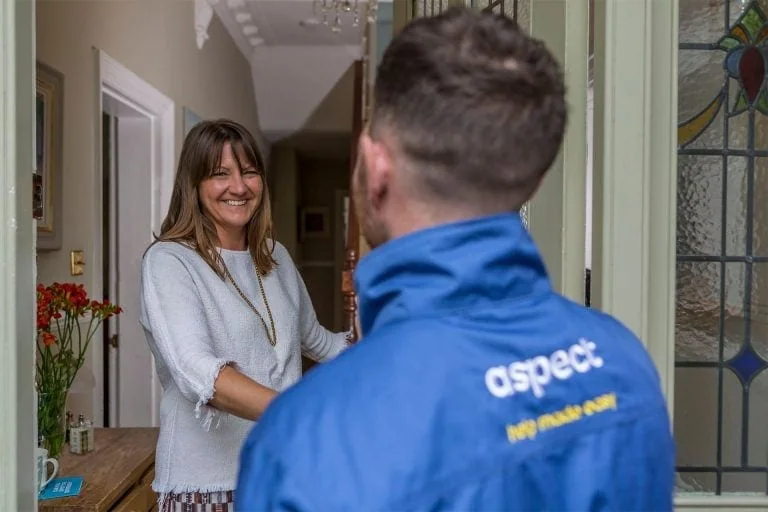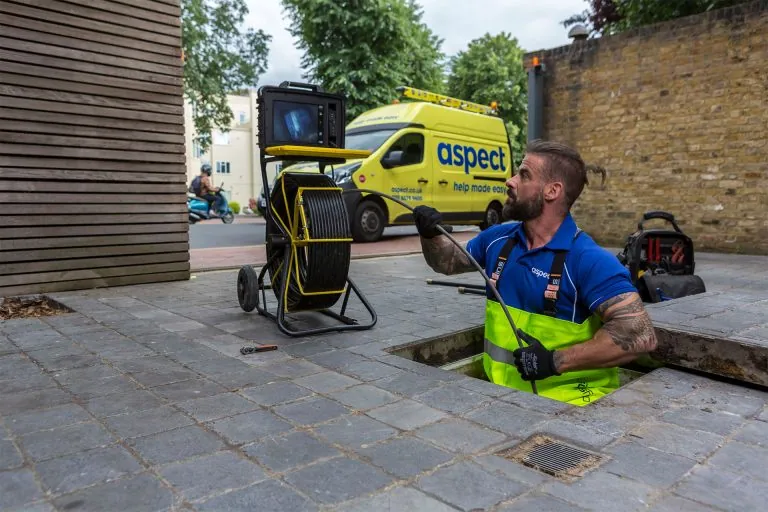Burst pipes and a leaky legacy; uncovering London’s leakiest boroughs
There is a constant challenge beneath London’s busy city streets: mains water supply leaks. London is an ageing city. Many of the water supply pipes in Greater London are upwards of 60 years old, with some of the oldest pipework dating back over 150 years.
Rising housing stock and constant construction of new properties have resulted in the need for higher water pressure to meet demand. This increase in pressure along old, degraded pipework can lead to leaks occurring somewhere down the line.
Even though homebuilding in the capital has slowed considerably in recent years, new properties across the boroughs put additional strain on the already busy system.
Using Aspect’s own leak detection data, we’ve mapped out London’s leakiest boroughs to reveal which areas residents are most likely to suffer from a water supply pipe leak.

Where are London’s leakiest boroughs?
| Rank | London Borough |
| 1 | Wandsworth |
| 2 | Westminster |
| 3 | Lambeth |
| 4 | Camden |
| 5 | Kensington and Chelsea |
| 6 | Southwark |
| 7 | Barnet |
| 8 | Richmond upon Thames |
| 9 | Islington |
| 10 | Brent |
According to the figures, Wandsworth is London’s leakiest borough, followed closely by Westminster and then Lambeth.
The City of London sees the fewest leaks, although it must be noted that the City is the smallest London borough by size. Huge construction work in the City of London probably means many communication pipes and supply pipes have been upgraded.
Barking and Dagenham saw the next fewest leaks, followed by Bexley and Hillingdon.
Murray Kemp, leak detection trade manager at property maintenance experts Aspect, said: “It’s not surprising to see the most supply pipe leaks taking place in central London. A lot of the supply pipes in Wandsworth and Westminster are made of lead and are easily 150 years old. Lead deteriorates over time, leading to pinhole leaks which can quickly grow more numerous, especially if water pressure is increased along the line.
“Wandsworth in particular has seen a large increase in the number of housing blocks over the last few years, all of which need a strong water supply. Water pressure in these areas will have been increased to ensure all new properties have sufficient pressure; this will speed the process of deterioration and will make leaks more noticeable as more water will be lost than if the water pressure was lower.
“From the data, it appears that areas in outer London experience fewer supply pipe leaks. This is likely because much of the network here is not so old, and therefore has had less time to develop faults. As this network ages, we can expect to see more leaks in these areas too. Freak leaks can occur anywhere, so wherever you live in Greater London, there is always the possibility of a leak occurring on your supply line.”
What causes supply pipe leaks?
There are dozens of reasons why you could have a leak in a supply pipe, including:
- Ageing infrastructure
Much of the country’s plumbing in major cities’ networks dates back to the Victorian era. These older pipes are much more susceptible to pinhole leaks and cracks. - Water pressure increases
As new properties are built, water pressure needs to be increased to ensure adequate flow to all connected households and businesses. Greater pressure can increase the likelihood of pipes that are already degraded to develop leaks. - Construction work and traffic
Vibrations and ground movement caused by heavy machinery accelerate the wear and tear on water supply pipes. There’s also physical damage to pipes that could take place during excavation work. Lots of basements being built in boroughs with densely packed housing stock is likely to have caused ground movement. - The British weather
Britain’s weather is unpredictable, with hot summers and cold winters creating two temperature extremes that pipes can’t always deal with. The expansion and contraction of the pipes during different seasons can eventually lead to cracks and leaks. - Natural movements
Even small movements in soil over decades can eventually create faults in pipes. These processes are natural.
How will I know if I have a water supply leak?
Quite often, the first time anyone knows that they’ve got a water supply leak is when they get a much higher water bill than usual. If there are no visible signs of a leak inside your property, it could be between the supply pipe and your internal stop valve (stopcock).
To find out whether or not you have a leak in your supply pipes, locate your stop valve inside your property and turn it off. Then, go take a reading from your water meter. This can often be found beneath the pavement just outside your property boundary. Wait an hour or two, and take another reading. If the reading has increased, it indicates a leak somewhere on the pipes buried between the meter and the stop valve.
Note that a small leak could take a long time to increase the reading, so it’s recommended to leave it as long as possible between the first and second readings.
It’s good practice to check for leaks in this way regularly. This will help to catch leaks as early on as possible.
Am I responsible for supply pipe leaks?
When it comes to who is responsible for mains water leaks, the answer is, it depends.
If the leak occurs outside of your property boundary, it’s your water provider who is responsible for repairing the leak. This includes if the leak occurs in the communication pipe between your meter and your boundary. Pipes outside of the property boundary are called “communication pipes”, inside the boundary, they’re called “supply pipes”.
If the leak occurs anywhere inside your property boundary, it’s your responsibility to fix the leak. If you’re unsure of where the leak is, use a leak detection specialist. They’ll be able to pinpoint the position of a leak without needing to dig. Excavation work would be needed to get visual confirmation on the extent of the leak and to carry out the repairs.
Should I replace my exterior pipework to prevent leaks?
Preventative measures could be considered to reduce the chances of leaks in the future, especially if you own an older property with ageing pipework. However, excavation work is costly, so we wouldn’t recommend replacing supply pipes unless you strongly suspect a problem.
If you ever undertake work to replace a driveway or do major garden renovations, you might want to consider this time to examine and potentially replace your pipework. Most supply pipes can be found between 750mm and 1500mm underground and are easy to find by a specialist with the right detection equipment. It’s much less disruptive to only have to dig up your driveway once, rather than after you’ve had a new one installed.
Note, we don’t recommend people try to find water pipes without professional knowledge and equipment, as digging might damage pipes, electrical, or telecoms cables.
Will my insurance pay out for leak repairs?
When it comes to whether or not insurance will pay out for repairs, it all depends on your policy and the individual circumstances of the leak.
Some providers could argue that a leak was caused by a lack of effective maintenance, meaning they won’t pay out if you’ve failed to look after your pipes.
However, if a leak has caused structural damage to your property that you didn’t know about, the insurer could pay out to fix or prevent further issues. It’s always recommended to check your policy information or contact your insurer directly if you need further clarification on what you can claim for.
Methodology
To create this data, Aspect used its own first-party leak detection callout data to determine which of London’s boroughs were the leakiest. Postcodes listed in callout data were aligned with properties in each borough and visualised using the mapping tool Datawrapper.
Data was collected between 2021 and June 2024.

Book a leak detection expert
Our specialists use advanced equipment and techniques to uncover hidden leaks.
- A quick response time
- 99% of leaks found and fixed
- Insurance claim support
- Half-hour rates from £49.50 + VAT
- 5% off labour when you book online
Other related services

Drainage Engineers
If you suspect your external drainage network is damaged and is either blocked or leaking, our drainage engineers can help. They can locate faults using a CCTV camera inserted within the pipework. Repairs can also be made without needing to excavate.

Plumbing Services
We have plumbers on call 24/7. They can be booked for work anywhere within and around the M25. They’re happy sharing their knowledge with you and keeping you updated on the work they’re carrying out. They can help with any supply supply issue.
Was this article helpful?
Think we could improve this article? Please let us know